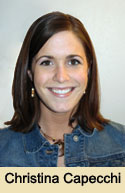Twenty Something / Christina Capecchi
The crucifix
in your cubicle
 NBC’s Emmy-winning comedy series “The Office” portrays work in all its mind-numbing dullness, punctuated by a slow-moving clock, lame insult swapping and a know-it-all co-worker.
NBC’s Emmy-winning comedy series “The Office” portrays work in all its mind-numbing dullness, punctuated by a slow-moving clock, lame insult swapping and a know-it-all co-worker.
Many viewers relate.
And if they’re seeking that fresh start in 2007, they just might file their two weeks.
Work is the pursuit that defines us, informing an introduction with a handful of assumptions and an invariable follow-up question. Work is the place we spend the majority of our waking hours. And when the “9 to 5” that Dolly Parton lamented begins well before 9 a.m. and extends to 6 p.m. or 7 p.m., work can be the source of “hardness of heart,” Pope Benedict XVI warned.
Hardness of heart happens when a job splinters a person’s skills and values, the pieces of a personality that beg to be integrated.
We bring more than a skill set to a job; we bring a belief system, too. “The whole person, body and spirit, participates in [work], whether it is manual or intellectual,” Pope John Paul II wrote in his 1981 encyclical “On Human Work.”
Faith informs work in various ways. It keeps us from cussing when the computer crashes. It compels us to credit a co-worker for a successful project. It drives us to seek a solution to a hopeless task. It prods us to be honest with the time sheet, to resist office gossip, to practice patience.
A Catholic worker heeds St. Francis of Assisi’s exhortation, preaching the Gospel at all times—and using words if necessary.
Ultimately, Pope John Paul II wrote, work allows us to draw close to our Creator, humbly advancing “the discovery of the resources and values contained in the whole of creation.” The talents God gave us are our tools to execute his unique design for our lives.
Whether science or art, entrepreneurial or managerial, every career has the capacity to be Catholic when we execute it with earnestness and tap into our God-given gifts. When an architect designs a stunning structure. When a counselor dispels self doubt. When a teacher enlightens a student. When a nurse tends to the ill.
Work that stems from the brain and connects with the heart bears a fingerprint that is holy. Whether we sit in a corner office or a crowded cubicle, we can each illuminate God’s glory.
I’m struck by Pope Benedict’s first public words upon his election. Standing on that balcony, facing an overwhelming audience and a daunting task, he leaned on the Lord.
“Dear brothers and sisters, after the great Pope John Paul II, the cardinals have elected me, a simple, humble worker in the vineyard of the Lord. The fact that the Lord knows how to work and to act even with insufficient instruments comforts me … .”
That fact also comforts young adults embarking upon careers, wrestling tangled ambitions, unscathed ideals and unpredictable reality.
There’s no how-to manual to follow, just the sense of a blank screen, an empty slate waiting for our signature.
Amid the haze of uncertainty, I can grasp one truth: A career can be steeped in spirituality. The pursuit of a paycheck and success also can be a personal offering to the Lord.
Even if newsmakers like Enron’s Jeffrey Skilling separate work and values, we can intertwine them. And we’ll feel better—and work better—when we do.
(Christina Capecchi is a graduate student at Northwestern University in Evanston, Ill.
E-mail her at christinacap@gmail.com.)†
 NBC’s Emmy-winning comedy series “The Office” portrays work in all its mind-numbing dullness, punctuated by a slow-moving clock, lame insult swapping and a know-it-all co-worker.
NBC’s Emmy-winning comedy series “The Office” portrays work in all its mind-numbing dullness, punctuated by a slow-moving clock, lame insult swapping and a know-it-all co-worker.